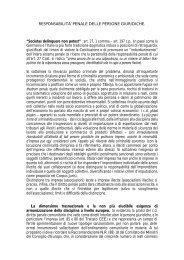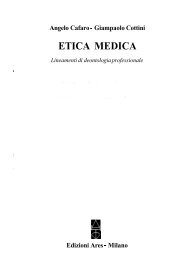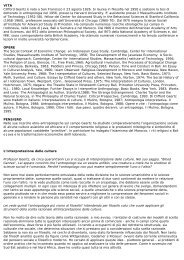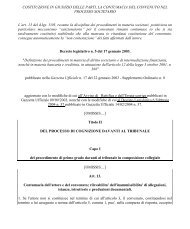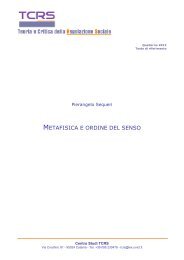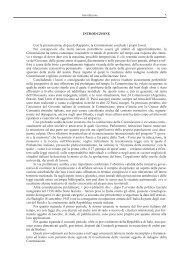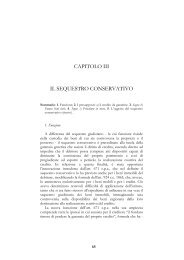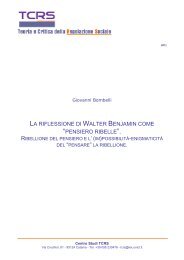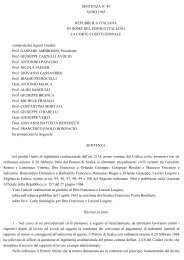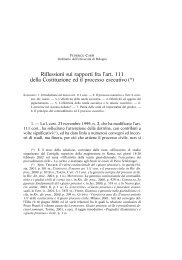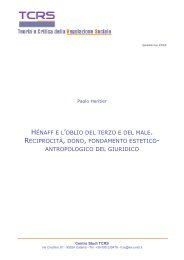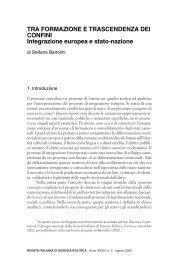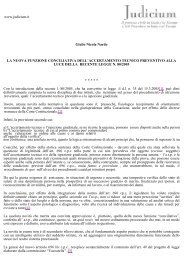FOGLI DI LAVORO per il Diritto internazionale 3 ... - Giurisprudenza
FOGLI DI LAVORO per il Diritto internazionale 3 ... - Giurisprudenza
FOGLI DI LAVORO per il Diritto internazionale 3 ... - Giurisprudenza
Create successful ePaper yourself
Turn your PDF publications into a flip-book with our unique Google optimized e-Paper software.
182<br />
<strong>FOGLI</strong> <strong>DI</strong> <strong>LAVORO</strong> <strong>per</strong> <strong>il</strong> <strong>Diritto</strong> <strong>internazionale</strong> 3/2008<br />
and 2 of the Basic Law. It quashed the judgment insofar as the<br />
applicant associations' claim had been dismissed in respect of<br />
the use of the expressions “destructive”, and “pseudo-religious”,<br />
and the allegation that they “manipulated their members” and<br />
referred that part of the complaint back to the Administrative<br />
Court of Appeal for a new decision. However, it found that the<br />
Government was authorised to characterise the applicant<br />
associations' movement as a “sect”, “youth religion”, “youth<br />
sect” and “psycho-sect” and was allowed to provide the public<br />
with adequate information about it.<br />
21. According to the Federal Constitutional Court, the right<br />
to freedom of religion or belief guaranteed by Article 4 §§ 1 and<br />
2 of the Basic Law did not prevent the State from entering into a<br />
public and even critical discussion about the aims and activities<br />
of religious groups. The limitations on the freedom of religion<br />
were to be found in other basic rights and freedoms guaranteed<br />
by the Basic Law, such as the protection of human dignity, the<br />
right to life and physical integrity and the protection of marriage<br />
and the fam<strong>il</strong>y.<br />
22. The power to manage State affairs derived directly from<br />
the Basic Law and authorised the Federal Government to<br />
provide information in all matters coming within the sphere of<br />
their overall State responsib<strong>il</strong>ity. Providing direct public<br />
information helped them to resolve conflicts within the State and<br />
society, to face challenges even if they occurred at short notice,<br />
to react quickly and adequately to the problems and concerns of<br />
citizens and assist them in finding guidance. This activity did<br />
not require an express legal provision, since it did not constitute<br />
a direct interference with the applicant associations' rights. It<br />
merely influenced the conduct of others vis-à-vis the applicant<br />
associations. Moreover, it was not possible to establish rules for<br />
the Government's information-imparting role, given the wide<br />
variety of the subject matter dealt with and methods used. When<br />
acting in the exercise of their power to direct State affairs, the<br />
Federal Government were entitled to provide information to the<br />
public, even if basic rights were indirectly affected as a result.<br />
23. However, the State had to restrict itself to neutral terms<br />
and act with moderation in matters of religion or belief.<br />
Defamatory, discriminating or deceptive statements were<br />
prohibited. The Government also had to respect the separation



